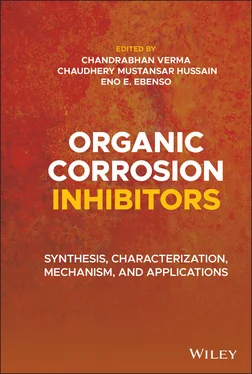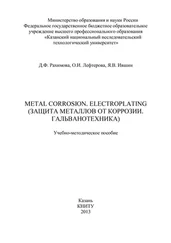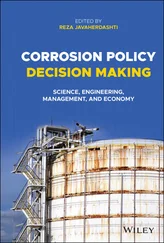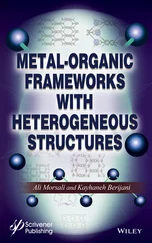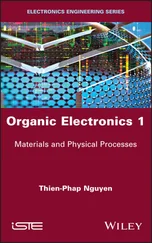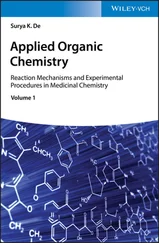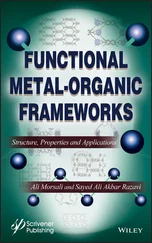1 Cover
2 Title Page
3 Copyright Page
4 Preface
5 About the Editors
6 List of Contributors
7 Part 1: Basics of Corrosion and Prevention 1 An Overview of Corrosion 1 Introduction References 2 Methods of Corrosion Monitoring 2.1 Introduction 2.2 Methods and Discussion 2.3 Conclusion References 3 Computational Methods of Corrosion Monitoring 3.1 Introduction 3.2 Quantum Chemical (QC) Calculations‐Based DFT Method 3.3 Atomistic Simulations Acknowledgments Suggested Reading References 4 Organic and Inorganic Corrosion Inhibitors 4.1 Introduction 4.2 Corrosion Inhibitors References
8 Part 2: Heterocyclic and Non‐Heterocyclic Corrosion Inhibitors 5 Amines as Corrosion Inhibitors 5.1 Introduction 5.2 Conclusion and Outlook References 6 Imidazole and Its Derivatives as Corrosion Inhibitors 6.1 Introduction 6.2 Corrosion Mechanism 6.3 Corrosion Inhibitors 6.4 Corrosion Inhibitors: Imidazole and Its Derivatives 6.5 Computational Studies 6.6 Conclusions References 7 Pyridine and Its Derivatives as Corrosion Inhibitors 7.1 Introduction 7.2 Summary and Outlook References 8 Quinoline and Its Derivatives as Corrosion Inhibitors 8.1 Introduction 8.2 Quinoline and Its Derivatives as Corrosion Inhibitors 8.3 Conclusion and Outlook References 9 Indole and Its Derivatives as Corrosion Inhibitors 9.1 Introduction 9.2 Synthesis of Indoles and Its Derivatives 9.3 A Brief Overview of Corrosion and Corrosion Inhibitors 9.4 Application of Indoles as Corrosion Inhibitors 9.5 Corrosion Inhibition Mechanism of Indoles 9.6 Theoretical Modeling of Indole‐Based Chemical Inhibitors 9.7 Conclusions and Outlook References 10 Environmentally Sustainable Corrosion Inhibitors in Oil and Gas Industry 10.1 Introduction 10.2 Corrosion in the Oil–Gas Industry 10.3 Review of Literature on Environmentally Sustainable Corrosion Inhibitors 10.4 Conclusions and Outlook References
9 Part 3: Organic Green Corrosion Inhibitors 11 Carbohydrates and Their Derivatives as Corrosion Inhibitors 11.1 Introduction 11.2 Glucose‐Based Inhibitors 11.3 Chitosan‐Based Inhibitors 11.4 Inhibition Mechanism of Carbohydrate Inhibitor 11.5 Conclusions References 12 Amino Acids and Their Derivatives as Corrosion Inhibitors 12.1 Introduction 12.2 Corrosion Inhibitors 12.3 Why There Is Quest to Explore Green Corrosion Inhibitors? 12.4 Amino Acids and Their Derived Compounds: A Better Alternate to the Conventional Toxic Corrosion Inhibitors 12.5 Overview of the Applicability of Amino Acid and Their Derivatives as Corrosion Inhibitors 12.6 Recent Trends and the Future Considerations 12.7 Conclusion References 13 Chemical Medicines as Corrosion Inhibitors 13.1 Introduction 13.2 Greener Application and Techniques Toward Synthesis and Development of Corrosion Inhibitors 13.3 Types of Chemical Medicine‐Based Corrosion Inhibitors 13.4 Application of Chemical Medicines in Corrosion Inhibition Acknowledgments References 14 Ionic Liquids as Corrosion Inhibitors 14.1 Introduction 14.2 Inhibition of Metal Corrosion 14.3 Ionic Liquids as Corrosion Inhibitors 14.4 Conclusion and Future Trends Acknowledgment Abbreviations References 15 Oleochemicals as Corrosion Inhibitors 15.1 Introduction 15.2 Corrosion 15.3 Significance of Green Corrosion Inhibitors 15.4 Overview of Oleochemicals 15.5 Literatures on the Utilization of Oleochemicals as Corrosion Protection 15.6 Conclusions and Outlook References
10 Part 4: Organic Compounds‐Based Nanomaterials as Corrosion Inhibitors 16 Carbon Nanotubes as Corrosion Inhibitors 16.1 Introduction 16.2 Characteristics, Preparation, and Applications of CNTs 16.3 CNTs as Corrosion Inhibitors 16.4 Conclusion Conflict of Interest Acknowledgment Abbreviations References 17 Graphene and Graphene Oxides Layers Application as Corrosion Inhibitors in Protective Coatings 17.1 Introduction 17.2 Preparation of Graphene and Graphene Oxides 17.3 Protective Film and Coating Applications of Graphene 17.4 The Organic Molecules Modified Graphene as Corrosion Inhibitor 17.5 The Effect of Dispersion of Graphene in Epoxy Coatings on Corrosion Resistance 17.6 Challenges of Graphene 17.7 Conclusions and Future Perspectives References
11 Part 5: Organic Polymers as Corrosion Inhibitors 18 Natural Polymers as Corrosion Inhibitors 18.1 An Overview of Natural Polymers 18.2 Mucilage and Gums from Plants 18.3 The Future and Application of Natural Polymers in Corrosion Inhibition Studies References 19 Synthetic Polymers as Corrosion Inhibitors 19.1 Introduction 19.2 General Mechanism of Polymers as Corrosion Inhibitors 19.3 Corrosion Inhibitors – Synthetic Polymers 19.4 Conclusion References 20 Epoxy Resins and Their Nanocomposites as Anticorrosive Materials 20.1 Introduction 20.2 Characteristic Properties of Epoxy Resins 20.3 Main Commercial Epoxy Resins and Their Syntheses 20.4 Reaction Mechanism of Epoxy/Amine Systems 20.5 Applications of Epoxy Resins 20.6 Conclusion Abbreviations References
12 Index
13 End User License Agreement
1 Chapter 5 Table 5.1 Effect of substituents on the corrosion inhibition efficiency of ... Table 5.2 Chemical structures of some common amides and thio‐amides used as... Table 5.3 Chemical structures of some common Schiff bases used as corrosion...Table 5.4 Chemical structures of some common amine‐based drugs and dyes use...
2 Chapter 6Table 6.1 Chemical structure of various imidazole derivatives calculated as...
3 Chapter 7Table 7.1 A summary of corrosion inhibition effect of some common reports o...Table 7.2 A summary of corrosion inhibition effect of some common reports o...Table 7.3 Informations about corrosion inhibition using quinoline derivativ...Table 7.4 Informations about corrosion inhibition using 8‐hydroxyquinoline ...
4 Chapter 8Table 8.1 Chemical structures, abbreviations, and nature of metal and elect...Table 8.2 Chemical structures, abbreviations, and nature of metal and elect...
5 Chapter 9Table 9.1 Indole‐based compounds as corrosion inhibitors for ferrous metalsTable 9.2 Indole‐based alkaloids as corrosion inhibitors of ferrous metal.Table 9.3 Indole‐based corrosion inhibitors of nonferrous metals
6 Chapter 12Table 12.1 Depiction of scientific findings attributable to amino acids as ...Table 12.2 Illustration of findings of the investigations related to the am...Table 12.3 Illustration of findings of the investigations related to the am...
7 Chapter 13Table 13.1 Names and chemical structure of some drugs used as corrosion inh...Table 13.2 Names and chemical structure of some expired drugs used as corro...
8 Chapter 14Table 14.1 ILs used to inhibit various metal corrosion in HCl medium.
9 Chapter 15Table 15.1 Composition of fatty acids in various oils.Table 15.2 A comparison of literature on the performance of oleochemicals a...
10 Chapter 16Table 16.1 Inhibitors, metal/electrolyte, methods applied, and outcomes of ...Table 16.2 Inhibitors, metal/electrolyte, methods applied, and outcomes of ...
11 Chapter 18Table 18.1 Some natural polymers successfully applied to various corrosion ...
12 Chapter 19Table 19.1 List of synthetic polymers used as corrosion inhibitor.
13 Chapter 20Table 20.1 Abbreviations, nature of metals, electrolytes, adsorption behavi...Table 20.2 Influence of external inorganic and organic additives on anticor...
1 Chapter 1 Figure 1.1 Corrosion cycle of steel. Figure 1.2 An electrochemical cell. Figure 1.3 Mechanism of rust formation. Figure 1.4 Classified forms of corrosion.
2 Chapter 2 Figure 2.1 Parameters of single coupon. Figure 2.2 Different shapes of metal coupons. (a) Strip/rectangular shape co... Figure 2.3 Presentation of anodic and cathodic Tafel curves and their extrap... Figure 2.4 The sinusoidal current response in a linear system on application... Figure 2.5 The making of Lissajous figure. Figure 2.6 Typical Nyquist plots for a Randles equivalent circuit with C dlC... Figure 2.7 A typical Randles plot. Figure 2.8 Typical Bode plot. Figure 2.9 Circuit for linear polarization resistance. Figure 2.10 Gamma radiography technique for corrosion inspection, (a) tangen... Figure 2.11 Pictorial presentation of (a) generation of pulse eddy current a... Figure 2.12 Schematic diagram for generating infrared thermogram.
Читать дальше
